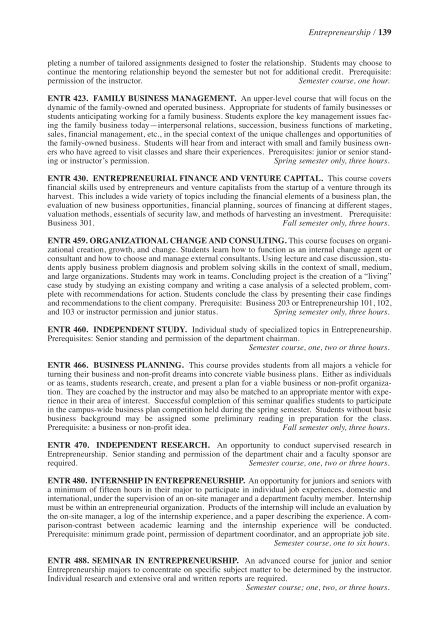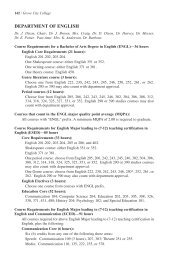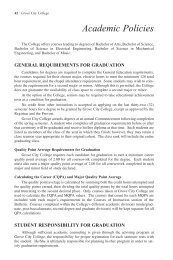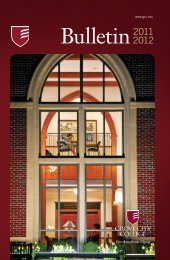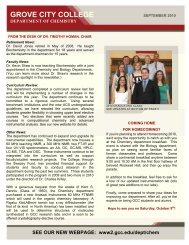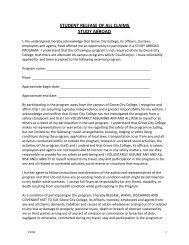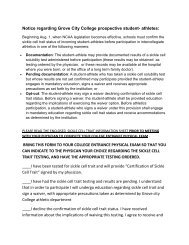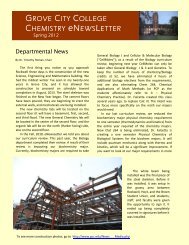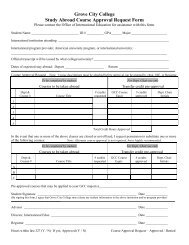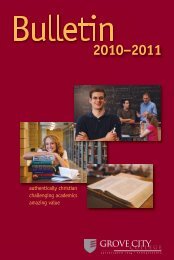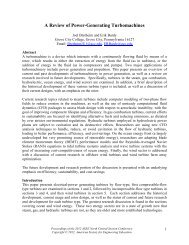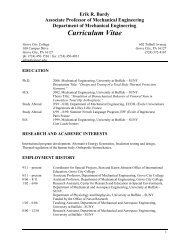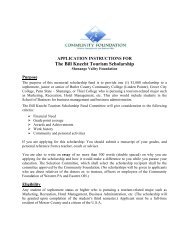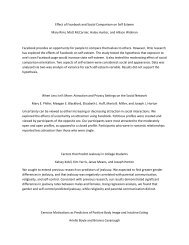2009–2010 - Grove City College
2009–2010 - Grove City College
2009–2010 - Grove City College
Create successful ePaper yourself
Turn your PDF publications into a flip-book with our unique Google optimized e-Paper software.
Entrepreneurship / 139<br />
pleting a number of tailored assignments designed to foster the relationship. Students may choose to<br />
continue the mentoring relationship beyond the semester but not for additional credit. Prerequisite:<br />
permission of the instructor. Semester course, one hour.<br />
ENTR 423. FAMILY BUSINESS MANAGEMENT. An upper-level course that will focus on the<br />
dynamic of the family-owned and operated business. Appropriate for students of family businesses or<br />
students anticipating working for a family business. Students explore the key management issues facing<br />
the family business today—interpersonal relations, succession, business functions of marketing,<br />
sales, financial management, etc., in the special context of the unique challenges and opportunities of<br />
the family-owned business. Students will hear from and interact with small and family business owners<br />
who have agreed to visit classes and share their experiences. Prerequisites: junior or senior standing<br />
or instructor’s permission. Spring semester only, three hours.<br />
ENTR 430. ENTREPRENEURIAL FINANCE AND VENTURE CAPITAL. This course covers<br />
financial skills used by entrepreneurs and venture capitalists from the startup of a venture through its<br />
harvest. This includes a wide variety of topics including the financial elements of a business plan, the<br />
evaluation of new business opportunities, financial planning, sources of financing at different stages,<br />
valuation methods, essentials of security law, and methods of harvesting an investment. Prerequisite:<br />
Business 301. Fall semester only, three hours.<br />
ENTR 459. ORGANIZATIONAL CHANGE AND CONSULTING. This course focuses on organizational<br />
creation, growth, and change. Students learn how to function as an internal change agent or<br />
consultant and how to choose and manage external consultants. Using lecture and case discussion, students<br />
apply business problem diagnosis and problem solving skills in the context of small, medium,<br />
and large organizations. Students may work in teams. Concluding project is the creation of a “living”<br />
case study by studying an existing company and writing a case analysis of a selected problem, complete<br />
with recommendations for action. Students conclude the class by presenting their case findings<br />
and recommendations to the client company. Prerequisite: Business 203 or Entrepreneurship 101, 102,<br />
and 103 or instructor permission and junior status. Spring semester only, three hours.<br />
ENTR 460. INDEPENDENT STUDY. Individual study of specialized topics in Entrepreneurship.<br />
Prerequisites: Senior standing and permission of the department chairman.<br />
Semester course, one, two or three hours.<br />
ENTR 466. BUSINESS PLANNING. This course provides students from all majors a vehicle for<br />
turning their business and non-profit dreams into concrete viable business plans. Either as individuals<br />
or as teams, students research, create, and present a plan for a viable business or non-profit organization.<br />
They are coached by the instructor and may also be matched to an appropriate mentor with experience<br />
in their area of interest. Successful completion of this seminar qualifies students to participate<br />
in the campus-wide business plan competition held during the spring semester. Students without basic<br />
business background may be assigned some preliminary reading in preparation for the class.<br />
Prerequisite: a business or non-profit idea. Fall semester only, three hours.<br />
ENTR 470. INDEPENDENT RESEARCH. An opportunity to conduct supervised research in<br />
Entrepreneurship. Senior standing and permission of the department chair and a faculty sponsor are<br />
required. Semester course, one, two or three hours.<br />
ENTR 480. INTERNSHIP IN ENTREPRENEURSHIP. An opportunity for juniors and seniors with<br />
a minimum of fifteen hours in their major to participate in individual job experiences, domestic and<br />
international, under the supervision of an on-site manager and a department faculty member. Internship<br />
must be within an entrepreneurial organization. Products of the internship will include an evaluation by<br />
the on-site manager, a log of the internship experience, and a paper describing the experience. A comparison-contrast<br />
between academic learning and the internship experience will be conducted.<br />
Prerequisite: minimum grade point, permission of department coordinator, and an appropriate job site.<br />
Semester course, one to six hours.<br />
ENTR 488. SEMINAR IN ENTREPRENEURSHIP. An advanced course for junior and senior<br />
Entrepreneurship majors to concentrate on specific subject matter to be determined by the instructor.<br />
Individual research and extensive oral and written reports are required.<br />
Semester course; one, two, or three hours.


